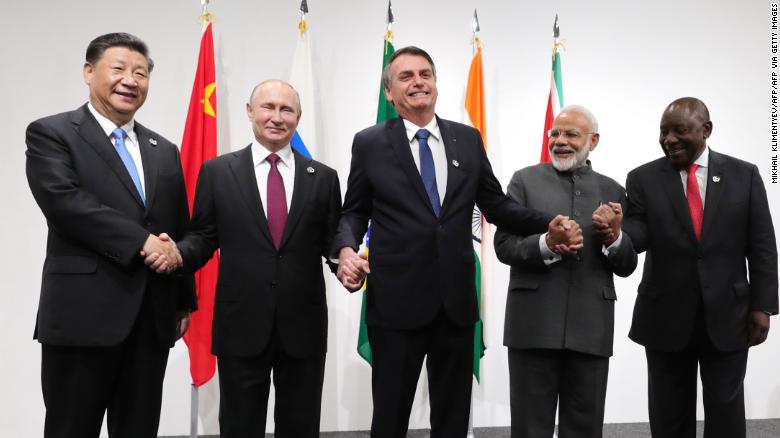Some of the crises of this period, like food insecurity and a rising debt crisis in the developing world, are those that the group — established in 2009 as a means to “serve common interests of emerging market economies and developing countries” — was ostensibly formed to address.
Since its inception, BRICS, which added South Africa in 2011, has been united in calling for more representation of major emerging economies on the world’s stage — and against what it views as a disproportionate dominance of the Western powers. That has meant pushing for reforms at the International Monetary Fund and the World Bank, and, on occasion, making a veiled jab at NATO actions.
It’s also seen the countries discussing issues like how to settle trade in their own currencies — outside the US dollar system — an issue that could now take more relevance for BRICS following Western sanctions on Russia, according to Shahar Hameiri, a professor and political economist at the University of Queensland in Australia.
Those penalties have cut off Russia’s central bank from most US dollar transactions, sanctioned banks and removed major institutions from international banking systems. That’s left countries that continue to do business with Russia scrambling for ways to avoid violating sanctions. Both India and China remain heavy buyers of Russian fuel.
“There’s not going to be any full-throated embrace of Russia (at this summit), there’s no doubt about it, and I’m sure there’s gonna be plenty of awkwardness there … but behind the awkwardness (de-dollarization) is one area where these governments do have a shared interest,” Hameiri said.
“Any kind of meaningful steps away from (a US dollar-denominated system) are potentially significant.”
Cross-purposes
Despite some common interests, the BRICS group has long been plagued by questions of cohesion, given outsized differences in its members’ political and economic systems, and their divergent geopolitical interests.
In addition, the complexities of Russia’s invasion of Ukraine may tone down any major outcomes of this week’s summit, even as — with the exception of Brazil — the BRICS nations other than Russia abstained from voting in a United Nations General Assembly resolution supported by 141 countries that called on Moscow to withdraw from Ukraine.
China, for its part, has accused NATO of provoking Russia to attack Ukraine, while similar rhetoric has circulated in public debate in India. In South Africa, Ramaphosa earlier this year told lawmakers the war could have been avoided if NATO had “heeded warnings” over considering Ukraine’s membership of its bloc.
And although Brazil voted to condemn Russia’s aggression against Ukraine at the UN, its leader Bolsonaro has hedged — saying days earlier the country would remain “neutral.”
Under normal circumstances, China would take the usual steps — touting BRICS as “a kind of soft alternative to the G7” and seeking to “portray BRICS as a leader for the developing world … against the club of wealthy capitalist democracies,” according to Sino-Russia relations analyst Alexander Gabuev. This would include members endorsing each others’ key projects, he added.
“Now it’s just harder to do because of Putin in the room,” said Gabuev, a senior fellow at the Carnegie Endowment for International Peace.
Meanwhile, a longstanding source of internal friction within BRICS remains unresolved: tensions between India and China, which in 2020 spiraled into a violent border clash.
On the one hand, BRICS has been a “way of ensuring some form of engagement with China” for India, according to CPR’s Singh. And this remains critical, as New Delhi is wary of provoking Beijing, especially as it has partnered with the United States, Japan and Australia on their Quad security grouping and is increasingly viewed by the US as part of its strategy to counter China, he said.
But these ties also make India more reticent to back major outcomes from a BRICS summit.
“I would be surprised if any substantive initiative is announced, because India would then be sending a message to the Quad and to its Western partners that it is willing to work very closely with China and Russia,” he said. “That would make India’s position very complicated.”
Another question is how other nations in the bloc will view a drive, long under discussion and expected to be spearheaded by China at Thursday’s summit, to expand the bloc to include more developing countries.
In a meeting with his BRICS counterparts last month, China’s foreign minister Wang Yi called for the group to start a member country “expansion process.”
Such an enlargement could play into perceptions from some parts that the West has shown a double standard in how it upholds international norms, according to Carnegie Endowments’s Gabuev, who says this has fueled an argument that the developing world, instead, should formulate those norms.
“Bringing more countries on board is something that gives it more legitimacy, but again, whether that will go beyond symbolism for now, I’m not so sure,” he said.


+ There are no comments
Add yours